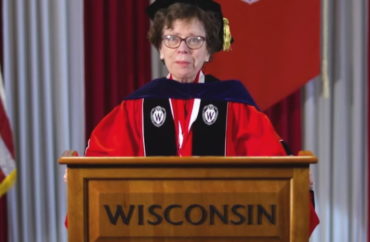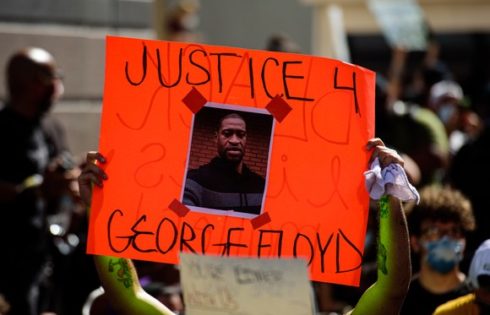
Emails provide a look at how chancellor managed angry protesters after George Floyd death
The fall of 2020 marked the end of a stressful year at the University of Wisconsin-Madison. The coronavirus had shut the campus down, drastically reducing the school’s revenues. Students were finally returning to their dorms, leading to a dramatic increase in Covid cases in the City of Madison. And in the wake of George Floyd’s death, student activists were hammering the administration for refusing to meet their demands, such as removing a statue of Abraham Lincoln from campus and neutering the UW Police force.
In a private email to an influential alumnus in October, UW-Madison Chancellor Rebecca Blank expressed her exasperation with campus activists that had continuously made demands of her.
“It’s a difficult time on campus,” Blank wrote to Dave Arnold, a member of the UW Cancer Center board. Arnold had written to Blank to tell her he found it “embarrassing” that the school would consider removing the Lincoln statue.
“I feel it is incumbent upon UW Madison to use this as a teaching moment to help these student ‘leaders’ to be aware of just how ridiculous this action appears,” Arnold wrote.
Blank responded by telling Arnold the campus had seen “lots of anxiety that tips into anger pretty quickly.”
“We have a small group of students who have decided that the big symbolic thing they want to do is to get the Lincoln statue torn down due to an action on his part that affirmed a court ruling sentencing 38 Dakota Indians to death,” she said.
Blank targeted a student activist for being overly obstinate during the trying months.
“Our student government leader is particularly oppositional this year, and has been difficult to work with collaboratively. This creates a lot of problems, since student government is an important group for communicating with students,” Blank said, noting any actions the student government takes are “nonbinding.”
“I’ve been quite clear in both public and private conversations that I will not agree to remove the Lincoln statue, although I am open to public discussions of Lincoln’s legacy that includes this event among others,” she added.
“It’s been a strange semester on campus,” Blank concluded. “Like all of us, I’ll be very glad when the uncertainty and angst of the present moment is behind us.”
UW-Madison spokeswoman Meredith McGlone told The College Fix that Blank was referring to “a particular student leader, not to student leaders generally.”
The emails, obtained by The College Fix through an open records law request, demonstrate the difficulty in running a large public university dedicated to racial justice while constantly under attack by young campus activists.
For instance, in her public statements, Blank took a more conciliatory tone when talking about demonstrations on the UW-Madison campus.
“This has been one of the most lively periods of activism we’ve experienced on campus during my seven years as Chancellor,” Blank said in a draft November 4 agenda for the Chancellor’s Advisory Committee.
“As is typically the case, this is in part due to external events (calls for racial justice and policing reform), broader social forces (polarization in our politics and pandemic response), and changes in relationships with key constituencies (local government officials and shared governance leadership),” Blank told committee members, soliciting their advice on how to handle it.
“This has been a challenge as these activities have been more angry and aggressive than in the recent past. I want your help in thinking about our response to this,” Blank said.
Wisconsin’s flagship campus has always been known for its aggressive progressive activism, even when it comes to the Lincoln statue.
In 2015, a student-led Black Lives Matter protest called for the statue’s removal, and in 2016, the statue was covered with a black tarp during another protest.
But campus protests intensified following the death of Minneapolis man George Floyd at the hands of police in May 2020.
On June 5, the Wisconsin Black Student Union released a list of demands, claiming the school is “not doing enough” for black students.
“Listen to your black students,” the statement said. “Empathize with your black students. Produce change for your black students. No more statements full of empty words. No more ‘we are trying’ or ‘these things take time.’ No more plastering our faces on your websites and brochures without caring about our experiences here first.”
Among the demands included removing the Lincoln statue, moving a boulder on campus that activists believe was once called a “n—erhead rock” (a term in the 1920s for a large dark boulder), and for Blank to meet personally with representatives from the Wisconsin Black Student Union.
In June, as mobs began pulling down statues around Madison, a viral video showed a shirtless activist in downtown Madison barking into a bullhorn, saying the school had one week to take the Abe statue down.
“If you don’t take it down, it’s coming down,” the man says. “If you don’t take it down, you better pay somebody to stand there, so we can take him and that statue down,” he says to cheers from the crowd gathered.
“The Native American students at UW-Madison have been asking for that fucking statue to be taken down for years!” yells a woman into the bullhorn. “This whole city — this whole state — stands on stolen land!” she screams.
“And you put the motherfucker that stole it at the top of the hill! Take him down!”
Soon, word about the demand to move the Lincoln statue hit the news sites, and Blank’s office was inundated with emails threatening to withhold funding from the school if it relocated The Great Emancipator. In the next few months, Blank’s office received nearly 200 emails from individuals about the Lincoln statue, 80 percent of which supported keeping it on campus.
“Chancellor Blank and other university leaders regularly receive input from students, faculty, staff, alumni and other stakeholders,” McGlone told The Fix in an email last week. “As leaders their goal is always to move forward in partnership, wherever possible, on efforts to make UW an even stronger institution and in particular to improve the experiences of underrepresented communities.”
On June 25, McGlone emailed a final copy of the chancellor’s statement to the rest of the staff.
“In response to public and media inquiries about the Lincoln statue, we are providing the following statement from Chancellor Blank to those who have asked about it. At this time it is not being broadly distributed,” she wrote.
“I believe that Abraham Lincoln’s legacy should not be erased but examined, that it should be both celebrated and critiqued,” Blank said in her statement. “To give just one example – without Lincoln, public land-grant universities like ours might not exist. These universities have been engines of social mobility and economic growth for citizens who would never otherwise have had access to higher education.”
That day, the statement was provided to The College Fix.
On July 21, Blank wrote to her staff to coordinate how to respond to letters about the Lincoln statue and campus reopening issues that were physically mailed to her.
“Since people actually took the time to write and post a letter, I think they deserve an acknowledgement,” she wrote.
“I don’t particularly want to write back personally – it invites a conversation I don’t want to have,” she said.
But the emails Blank received criticizing her handling of racial issues on campus remained intense and personal.
“The statements you have made about the Lincoln statute are nothing short of white supremacist ideology,” wrote one anonymous emailer in June. “We are an institute of learning and we do that in every discipline without statutes [sic].”
In August, after Blank issued a campus wide email in support of the Black Lives Matter movement, a senior at the school emailed her to complain that it was too late.
“Your email is full of bullshit, and you know it is… because you are smart, if not compassionate,” the student wrote.
“You have the audacity to say that you LISTEN to the students. White students line up to sit in Lincoln’s lap, and you can’t let that go, so you allow a symbol of racism to sit and overlook the entire university, clearly communicating to BIPOC students that you give zero fucks about them,” the student wrote.
Early in the summer, Blank began responding to the increased pressure by issuing a blog post in which she conceded that she had benefited from white privilege.
“As someone who has benefitted from White privilege, my first action must be to listen with humility and empathy – to faculty and staff, to students, and to others who love UW and also recognize its shortcomings,” she wrote. She further boasted of the school’s diversity efforts that included bringing “White Fragility” author Robin DiAngelo to campus to speak.
Further, Blank proposed a new requirement that all new students receive mandatory training on race relations, to give them “an understanding about culture, identity, and difference, as well as the skills and commitment to create a community that is inclusive of all people.”
But the activists were not satisfied with her efforts.
In September, the student government passed a vote of no confidence in the campus police department, citing a “lack of confidence and trust” in the UWPD and an unwillingness to meet “all or most of the reforms” requested by the student council.
And as students marched across campus wearing all black to protest the lack of response to their demands, the council passed a resolution in favor of the Lincoln statue being “reevaluated and then removed and/or replaced based on inputs from BIPOC students.”
“Abraham Lincoln is a representation of ethnic cleansing of indigenous folks and the fact that UW-Madison stands on stolen land,” ASM Diverse Engagement Coordinator Chrystal Zhao told The Fix at the time.
In October, Blank responded to the campus BIPOC Coalition’s demands to meet with her by making campus Dean of Students Christina Olstad available for an online discussion. But the group objected, demanding to meet with Blank herself, a request she later granted.
“We appreciate that you have finally made time in your schedule to meet with us to begin discussions regarding the experiences and concerns of BIPOC students on this campus,” the group snarkily wrote back to Blank.
“We hope that this meeting serves as the starting point between marginalized groups on campus and administration as we work to rectify the systems in place that allow the continuation of mistreatment of BIPOC folx at this university,” the group wrote.
The BIPOC coalition’s demand to meet with Blank carried other demands with it.
“We would like to minimize small talk and maximize the amount of time that BIPOC voices are heard, so we are requesting that administrative faculty introduce themselves in the meeting
chat while the BIPOC Coalition and co-affiliates begin our presentation,” the group wrote.
The group also demanded they not be interrupted while lecturing Blank.
“We also want to make it clear that while we welcome dialogue, any commentary from administrative representatives must wait until the completion of our presentation to ensure that we are able to fully utilize the time allotted to us,” they insisted.
An hour after getting the email from the BIPOC Coalition, Vice Chancellor for Student Affairs Lori Reesor emailed Blank and her staff to acknowledge the importance of listening to the full presentation, but also urging a strategy regarding “communication expectations and next steps after this first meeting.”
“Yes, we need to be clear about next steps and who they will be talking with,” Blank responded.
“I take their communication from today as saying ‘No, we must talk with the Chancellor moving forward.’ We need to be clear that this is not the appropriate mechanism for moving any conversation forward on their issues,” Blank said.
“Chancellor Blank was referring to the fact that although the group was seeking to meet with her, there are other university leaders (such as the Dean of Students) who are more directly responsible for acting on the issues the coalition is concerned about,” McGlone told The Fix. When asked what was discussed during the online call with the BIPOC Coalition, McGlone said the university does not generally comment on meetings the chancellor has with individuals or groups.
Of course, as racial activists on campus pushed forward with their demands, it prompted a backlash from notable conservatives, who accused the administration of losing control of the campus.
On October 30, one of Blank’s communications staffers emailed her a link to an article by Jonathan Turley that defended Lincoln against charges of his racism.
A few minutes later, McGlone replied, suggesting Blank respond by posting a comment on the chancellor’s blog with the campus position and “pointing out that the resolution is non-binding.”
“I’d definitely vote ‘no response’ on this right now,” Blank answered.
“Our campus has a long history of activism so it’s not surprising that there will be differences of opinion, sometimes strong ones,” McGlone told The College Fix last week. “That doesn’t prevent us from trying to maintain communication whenever possible, to help move forward.”
IMAGE: YouTube screenshot
Like The College Fix on Facebook / Follow us on Twitter






Please join the conversation about our stories on Facebook, Twitter, Instagram, Reddit, MeWe, Rumble, Gab, Minds and Gettr.